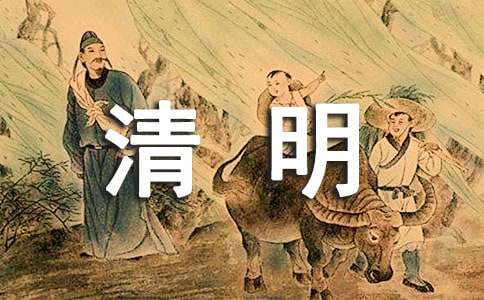清明節風俗傳統英語介紹
celebrated two weeks after the vernal equinox(24節氣之一的春分), tomb sweeping day is one of the few traditional chinese holidays that follows the lunar calendar(lunar calendar,意為農歷、陰歷)--typically falling on april 4, 5, or 6. its chinese name "qing ming" literally means "clear brightness," hinting at its importance as a celebration of spring. similar to the spring festivals of other cultures, tomb sweeping day celebrates the rebirth of nature, while marking the beginning of the planting season and other outdoor activities.

qing ming jie in ancient times
古代的.清明節
in ancient times, people celebrated qing ming jie with dancing, singing, picnics, and kite flying. colored boiled eggs(原來古代中國的清明節和西方復活節一樣有彩蛋……小編只能感嘆歷史驚人的相似了……) would be broken to symbolize the opening of life. in the capital, the emperor would plant trees on the palace grounds to celebrate the renewing nature of spring. in the villages, young men and women would court each other.
the tomb sweeping day as celebrated today
慶祝春天的清明
with the passing of time, this celebration of life became a day to the honor past ancestors. following folk religion(folk religion,民間習俗、信仰), the chinese believed that the spirits of deceased ancestors looked after the family. sacrifices of food and spirit money could keep them happy, and the family would prosper through good harvests and more children.
today, chinese visit their family graves to tend to any underbrush that has grown. weeds are pulled, and dirt swept away, and the family will set out offerings of food and spirit money(注意紙錢的官方說法啊:spirit money). unlike the sacrifices at a family's home altar, the offerings at the tomb usually consist of dry, bland food. one theory is that since any number of ghosts rome around a grave area, the less appealing food will be consumed by the ancestors, and not be plundered by strangers.
【清明節風俗傳統英語介紹】相關文章:
清明節有哪些傳統風俗04-06
清明節的由來和傳統風俗02-16
傳統訂婚風俗02-11
春節傳統風俗資料02-03
家鄉過年傳統風俗02-27
東北傳統過年風俗03-01
過年的傳統風俗03-12
家鄉春節傳統風俗02-07
廣州過年傳統風俗02-13
